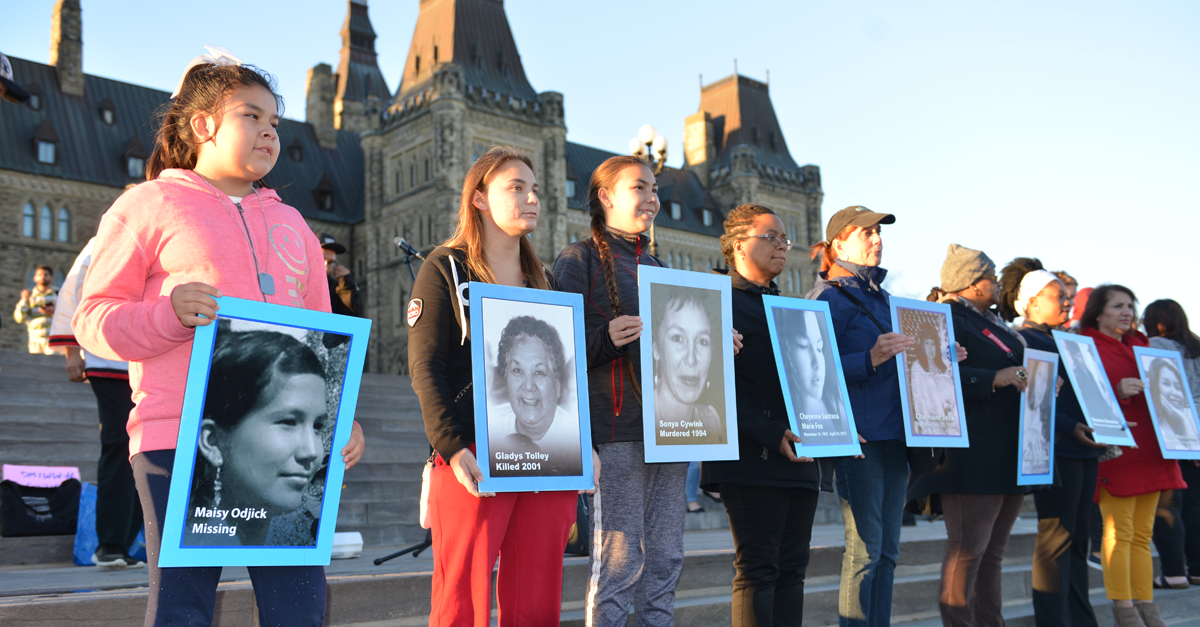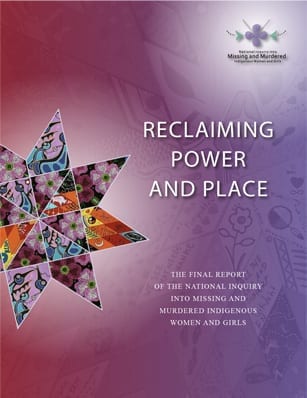The disproportionately high rates of murdered and missing Indigenous women, Girls (and 2SLGBTQIA+) in Canada was labelled a genocide in the 2019 final report of the National Inquiry into MMIWG. This designation shed light on the pervasiveness of this crisis, and confirmed a belief among many people with personal experience: “this country is at war, and Indigenous women, girls, and 2SLGBTQIA+ people are under siege.” (MMIWG Final Report). This issue of gender-based violence is a means of the violent perpetuation of settler-colonialism which helped to establish the Canadian state, and continues to contribute to its maintenance. For more background on Colonization and its connection to gender-based violence against Indigenous people visit Colonization as Gendered Violence .
Statistics
<aside>
<img src="/icons/star_gray.svg" alt="/icons/star_gray.svg" width="40px" /> The statistics regarding Missing and Murdered Indigenous Women and Girls vary depending on the sources used. So, the below statistics are gathered from a variety of sources which are each linked below. There are some claims that sources like the RCMP may underreport the severity of the issue, whereas some interest groups stakes may be represented in their statistics. No matter which sources’ statistics you regard as valid, it is undeniable that violence against Indigenous Women and Girls is a prevalent issue.
</aside>
- Indigenous women made up roughly 16% of all female homicides between 1980 and 2012, despite making up only 4% of the female population. (Figure 5, RCMP)
- From 2001 to 2014 the average rate of homicides involving Indigenous female victims was four times higher than that of homicides involving non-Indigenous female victims. (AFN)
- For the period from 2015 to 2020, the average homicide rate involving Indigenous victims (8.64 per 100,000 Indigenous people) was six times higher than the homicide rate involving non-Indigenous victims (1.39 per 100,000 non-Indigenous people). The homicide rates for Indigenous people were particularly high in the Prairie provinces and in the territories. (Statistics Canada)
- Indigenous women make up 16% of all female homicide victims, and 11% of missing women, even though Indigenous people make up 4.3% of the population of Canada. (AFN)
- Indigenous women and girls now (2019) make up 24% of female homicide victims. (MMIWG Final Report)
- According to a study by Marianne Pearce at the university of Manitoba in 2016, Indigenous women and girls are 12 times more likely to be murdered or missing than any other women in Canada, and 16 times more likely than Caucasian women.
- Indigenous women are also more likely to be killed by acquaintances than non-Indigenous women, and are seven times as likely to be targeted by serial killers. (MMIWG final report)
- Indigenous women are sexually assaulted three times more often than non-Indigenous women, and most of the women and children trafficked in Canada are Indigenous. (MMIWG final report)
- Statistics Canada has found that even when all other differentiating factors are accounted for, Indigenous women are still at a significantly higher risk of violence than non-Indigenous women. This validates what many Indigenous women and girls already know: just being Indigenous and female makes you a target. (MMIWG final report)

This statistic from the RCMP show the female homicide rates from 1996-2011, but many critics argue that this statistic does not show the extent of the issue and the fact that it is actually getting worse.

Causes
- historical, multigenerational, and intergenerational trauma;
- This pathway refers to a collective trauma linked to colonialism that many Indigenous people experience sometimes explained as “historical trauma” (“cumulative emotional and psychological wounding over the lifespan and across generations, emanating from massive group trauma.”) as well as well as individual “soul wounds” (deep emotional, spiritual, and psychological pain.)
- social and economic marginalization;
- This pathway is included since Indigenous people, and especially Indigenous Women, girls and 2SLGBTQQIA “experience poverty, homelessness, food insecurity, unemployment, and barriers to education and employment at much higher rates than non-Indigenous people.” This social and economic marginalization is a result of colonial systems within which Indigenous people have been forced to live, and try to survive.
- maintaining the status quo and institutional lack of will; and
- This pathway refers to the denial “by colonial governments, institutions, and agencies as well as individual relationships and communities” of Indigenous women, girls, and 2SLGBTQIA people knowledge of solutions to ending violence in their lives. These pathways, especially as they intersect, construct vulnerability to violence.
- ignoring the agency and expertise of Indigenous women, girls, and 2SLGBTQQIA people.
- This pathway is a description of the experience that families and survivors had when interacting with the child welfare system, the justice system, the health care system, and with police, schools, and universities, and even with some advocacy and anti-violence agencies. A facet of this experience was “an institutional culture that individualized the challenges they faced, rather than recognized that these challenges were a reflection of the ways the institutions contribute to Indigenous stereotypes.”
Solutions
The Final Report MMIWG includes calls for justice which are solutions to end this genocide centred around addressing the four pathways in the causes section. It is identified in the report that the solutions to this genocide must be as complex as the causes of this very issue, and it is recognized that ending this form of violence must be done with:
- A Focus on Substantive Equality and Human and Indigenous Rights
- A Decolonizing approach
- The inclusion of families and survivors
- Self-Determined and Indigenous-Led Solutions and Services
- Cultural Safety
- A Trauma-Informed Approach
These calls to justice cover Human and Indigenous Rights and Governmental Obligations, Culture, Health and Wellness, Human Security, Justice, and Calls for Industries, Institutions, Services, and Partnerships. Many of the calls to action require significant systemic change as the issue of Murdered and Missing Indigenous Women and girls is embedded in many of our institutions and systems. To read the full document with all of the calls to action please see the attachment below.
Attached are the Calls to justice presented in Reclaiming Power and Place: The Final Report of the National Inquiry into Missing and Murdered Indigenous Women and Girls.
Attached are the Calls to justice presented in Reclaiming Power and Place: The Final Report of the National Inquiry into Missing and Murdered Indigenous Women and Girls.


Progress
Many advocated say that since the Final Report of the National Inquiry into Missing and Murdered Indigenous Women and girls was released, there has not been enough done to end this issue of gender-based violence. If you are curious about the criticisms of Indigenous advocate groups and activists read the following article which will give you a glimpse into the injustices still being felt, and the proposed changes that have not yet been made.
'A national shame,' say advocates about lack of progress on MMIWG action plan | CBC News
Resources for Learning and Allyship
The following resources have been provided by the national inquiry Into Missing and Murdered Indigenous Women and girls. If you are looking for tools which can allow you to be a better ally, or learn more about this subject, read the final report, or visit the following webpages.
Publications | MMIWG
Publications | MMIWG
10 ways to be an ally to First Nations communities
News




